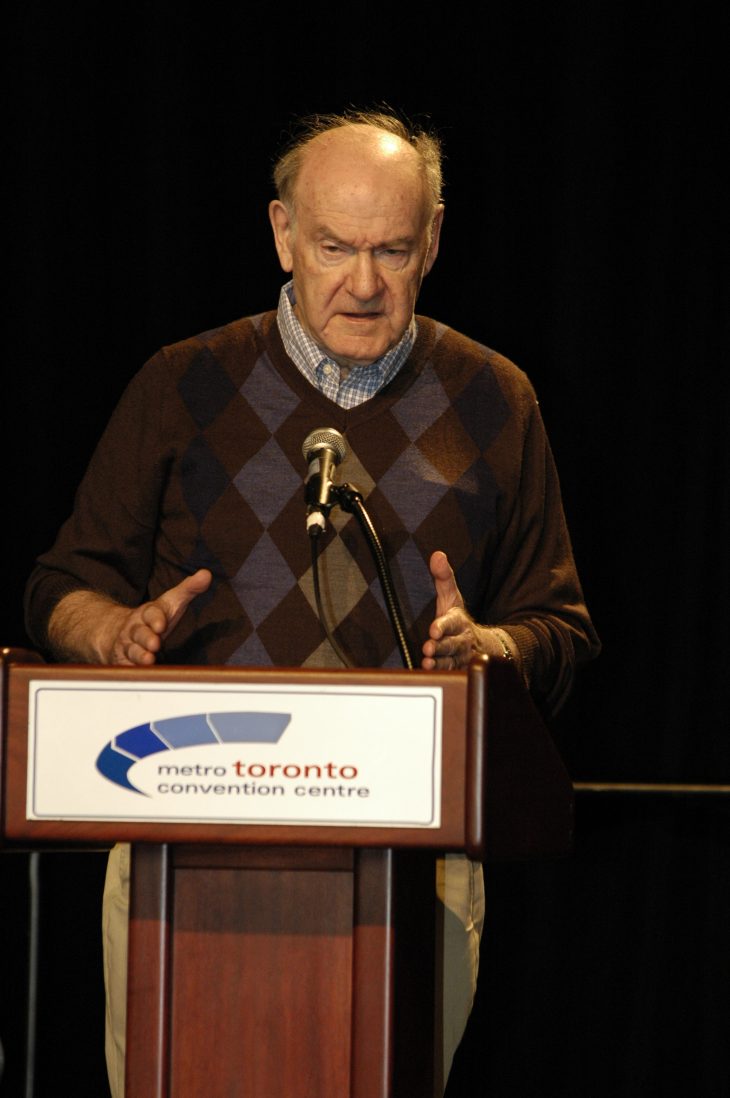
TORONTO – It wasn’t a long speech, but did hit a number of nails on the head, with a sledgehammer.
Legendary cable engineer Israel “Sruki” Switzer, whom we profiled here, opened the Canadian Summit of the SCTE Tuesday with a bang – telling the 200-plus folks at breakfast that RF – collectively, their bread and butter and the way cable television has been delivered for nearly six decades – is at the end of its useful life.
Switzer has designed and built cable and telecommunications infrastructure around the world, beginning in the 1950s and once said: “I’m just a plumber. I put pipes together and I really don’t care what people choose to flush down them,” he recalled during his speech.
“And I submit to you,” he continued yesterday morning, “that most of us at SCTE are still that, today. We put pipes together. We make sure they’re clean, that they don’t get clogged, they’re reliable – and what people put through those pipes have nothing to do with our professional responsibilities.
Whatever the content and no matter what else goes on, the network will always need its plumbers, he added. The hard wired networks which cable telecom engineers built, and continue to build and maintain “will continue to do the heavy lifting in the foreseeable future,” he said.
But for the youngsters in the crowd, he had a tip that likely made the cable veterans at breakfast choke on their Danishes, just a little. “My advice here to new people, to people starting in this business, is forget RF," Switzer (pictured) added.
“There’s no question that the future of the networks we operate is going to be IP, increasingly over fibre and… coax cable, wherever it survives long enough to still be useful… will be converted to carriers of IP.”
“RF, I just don’t believe, will be a long lasting technology.”
The coming years are going to see plenty of change beyond the move away from RF, the 81-year-old insisted. “I suggest to you then the mid-term, the five-to-10-year future, is an even further separation… of content from transport,” he explained, as networks are forced to add more fibre and then become far more neutral in how they operate.
Without naming names, Switzer mentioned what he saw as “egregious abuses of the public’s interest,” by those in charge of broadband networks, adding: “The control that the owners of cable networks have over what is carried on those networks will have to change. Network neutrality is going to become a fact within 10 years,” he insisted.
“I’ve been asked, ‘how can that possibly happen? We have all of these vested interests, huge amounts of capital. Shareholders, institutions, thousands of people working, so how will they be affected?’
“The answer I give is to look at the health system in the U.S. There is change going on which two or three years ago I would have said would be impossible.”
“Over the next 10 years, if they can change the health system in the U.S. they can surely change the nature of broadband delivery services, not only in this country, but in the U.S. and many places abroad.”
Switzer tied his thesis to the recent fight between Disney and American cable company Cablevision, where a fee for carriage dispute over ABC nearly led to much of New York City missing Sunday’s Academy Awards broadcast.
“Is content king in this business?” Switzer then asked rhetorically.
“Yes, but only if the content is the World Series, the Olympics, the Oscars. If you’ve got world-beater content, it will always prevail.
“But 90% of the content we carry is not in that category and we will find increasingly then that for everybody network equality, network neutrality, will become the dominant operating philosophy.”


